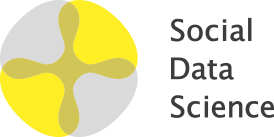GRADUATE ADMISSIONS
Doctoral Program
OVERVIEW
- The Doctoral Program selection process consists of a document screening (research proposal, etc.) and an oral examination that assesses advanced knowledge of social science and data science, as well as the logical thinking skills necessary to generate new insights. The program has an enrollment capacity of 7 students. There is a single selection process for all applicants, regardless of background (recent Master's graduates, working professionals, international students, etc.).
Primary Screening (Document Review)
- Applicants will be evaluated based on the documents submitted at the time of application. These include:
- Research Proposal for the doctoral program (written in English).
- Academic Transcripts from both Master's and Bachelor's degree programs.
- Master's Thesis or Professional Degree Thesis (Applicants who are currently completing their Master's or Professional Degree program may submit a thesis proposal instead).
- Official score report from one of the following English proficiency tests: TOEFL iBT®, IELTS (Academic Module), or Duolingo English Test.
- Other Supporting Materials (optional).
Secondary Screening (Oral Examination)
- Applicants who pass the primary screening will be invited to an oral examination. The examination will be based on the content of the submitted documents (especially the research proposal).
- The final selection and admission decision will be based on a comprehensive evaluation of both the primary screening and the oral examination.
- The evaluation will focus primarily on advanced knowledge and logical thinking skills within the applicant's chosen specialization, but will also consider the applicant's motivation for practical application of their research and their advanced English communication skills.
Doctoral Program
| 2026 Admissions Schedule for the Graduate School of Social Data Science (Doctoral Program) | |
| Application Period | January 5, 2026 (Monday) – January 9, 2026 (Friday) |
| Primary Screening (Document Review) Results Announcement |
February 3, 2026 (Tuesday), 10:00 AM |
| Secondary Screening (Oral Examination) |
February 13, 2026 (Friday), and February 14, 2026 (Saturday) Reserve Date |
| Final Admission Results Announcement | February 19, 2026 (Thursday) |
| Enrollment Procedure Period | February 26, 2026 (Thursday) – March 5, 2026 (Thursday) |
- What career paths and employment opportunities are envisioned for graduates of the Graduate School of Social Data Science?
-
The Graduate School of Social Data Science aims to cultivate specialists in social data science, a field that merges social science and data science. These specialists will be able to independently utilize cutting-edge knowledge, identify new problems, and lead solutions. We define a social data science specialist as someone who contributes to society through the expertise gained through education and research. We envision two primary career paths:
1.Advanced Professional Roles
Examples include data analysts in consulting firms, risk managers responsible for integrated risk management in financial institutions, product managers overseeing not only product development but also distribution and sales in manufacturing companies, and project managers leading teams that analyze detailed purchaser data to develop advertising and sales plans in retail. Furthermore, in policy-making institutions, Evidence-Based Policy Making (EBPM) is increasingly required in all areas. Graduates could hold positions ranging from analysts who conduct data analysis to executive-level roles that interpret analytical results and guide policy implementation.
2.Research Positions in Interdisciplinary Fields
Graduates may pursue further doctoral studies at universities in Japan and abroad, leading to research careers in universities, public research institutions, or private research organizations. These researchers are attracting attention for conducting data-driven research in social science fields such as business administration, economics, law, sociology, political science, history, psychology, and education, shedding light on new problems that could not be solved by traditional methods.
- Does the program plan to accept students with professional work experience?
-
Yes, we welcome applications from individuals with work experience in private companies, policy-making institutions, or those who have already started their own businesses. We aim to provide an environment where students can leverage their practical experience and problem-solving perspectives while systematically acquiring the advanced knowledge and skills that are difficult to obtain solely through practical work, thus creating academic added value.
- Is it possible to consult with a potential faculty advisor about my research plan before submitting my application?
-
While we cannot provide direct feedback on the "Research Proposal" document itself, questions about research areas and laboratory visits are permitted up to the application deadline, provided the faculty member agrees. If you wish to have a preliminary consultation (meeting) with your desired faculty advisor, please contact us through the inquiry form on the School of Social Data Science website (direct contact with the faculty member is also permitted).
Please note the following
•Whether or not you have a preliminary consultation (meeting) will not affect the selection process or interview evaluation.
•Consultations are welcome to discuss whether your research interests are feasible within the program, but we will not provide specific guidance on application documents (especially the research proposal).

